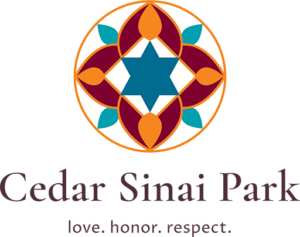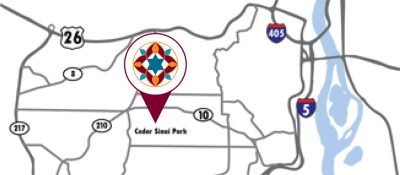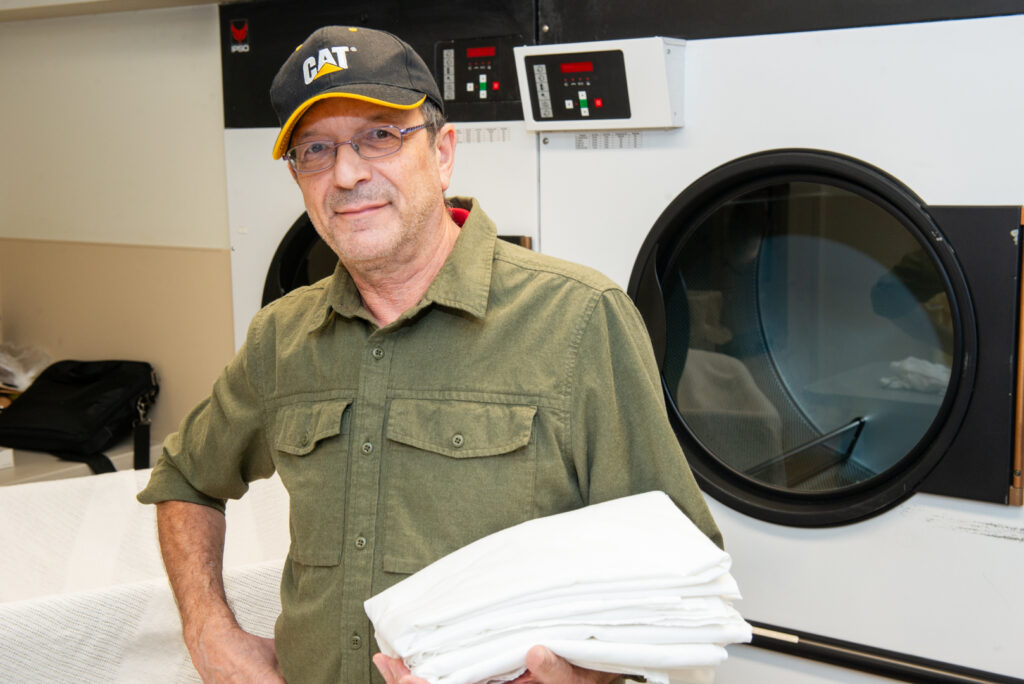
If you hear joyous singing or whistling when you’re in the Home, it’s probably Manuel “Manny” Entrambasaguas.
The longtime laundry aide loves to sing while he works; so much, in fact, his mother asked him as a little boy to sing professionally. Instead, Manny now sings informally while supervising the washing, drying, and folding of the Robison Jewish Health Center/Harold Schnitzer Center for Living laundry—what is about 500 sheets, towels, and blankets a day.
If you hear joyous singing or whistling when you’re in the Home, it’s probably Manuel “Manny” Entrambasaguas.
The longtime laundry aide loves to sing while he works; so much, in fact, his mother asked him as a little boy to sing professionally. Instead, Manny now sings informally while supervising the washing, drying, and folding of the Robison Jewish Health Center/Harold Schnitzer Center for Living laundry—what is about 500 sheets, towels, and blankets a day.
“I like it here,” said Manny. “The people are nice and the noise of the machines is peaceful.”
Manny grew up in Rota, on the southeastern tip of Spain. Beginning at age 12, until he was 18, Manny went to his father’s car shop every day after school to help detail automobiles. His younger brother came to help, too.
With a U.S. Naval base nearby, Manny’s dad’s car shop served a lot of American customers. Manny took English classes to converse with the shop clientele.
When their father retired, the brothers took over the shop. Around that time, Manny met an American woman from the base who was originally from Forest Grove, Oregon.
They flew to Oregon to get married in 1995, returning to Spain. The U.S. Navy then stationed Manny and his wife in such places as Portland, Maine, Iceland, and Florida.
The couple had three daughters along the way: Jennifer, Chelsea, and Nicole. Manny took a variety of jobs (gas station attendant, grocery store stocker, child care worker, house painter, etc.) and scheduled his shifts around the girls’ schedules so he could care for them while his wife was at work.
The couple split in 2009, and the girls moved to Oregon, with Manny returning to Spain to care for his mother who had been diagnosed with dementia. Manny worked for his brother who had closed their father’s shop and opened a newer, bigger detailing business.
Returning to the United States in 2011, Manny worked at a body shop and a post office among other gigs. He began working at Cedar Sinai Park 10 years ago, first as a housekeeper, and then in the Robison laundry.
“I love to work with my hands,” he said. “I try to keep happy, and say hello and good morning to everyone.”
A typical day for Manny has him at Robison by 3:30 a.m. to start the wash so it is clean and dry and folded and ready for him to deliver to resident rooms as soon as the rhythm of the day begins.
In his off time, Manny loves to explore Portland and is an amateur photographer. Some of the Robison households are decorated with his black and white photos of Robison staff. Manny’s daughters recently sent him back to Spain for his first visit in a decade. When his brother is in the country to renew business for his car shop, Manny visits him, typically in the mid-west.
“I’m in a good place,” said Manny.
###
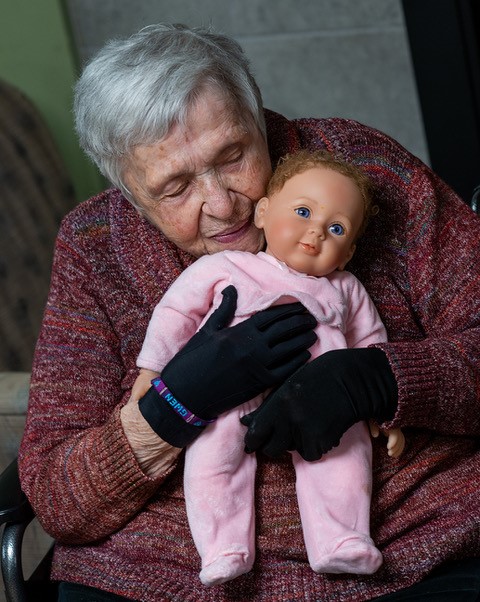
Everyone needs a little comfort now and then.
That’s why many elements of our robust Life Enrichment program for residents in long-term care involve activities that evoke strong memories. Activities that residents in long-term care enjoyed in their lives previously—arranging flowers, painting, planting, cooking—all are strategically incorporated into our model program. Such activities are especially important for residents with dementia, or in the middle to late stages of Alzheimer’s.
To help elders who have a strong need to nurture,
Everyone needs a little comfort now and then.
That's why many elements of our robust Life Enrichment program for residents in long-term care involve activities that evoke strong memories. Activities that residents in long-term care enjoyed in their lives previously—arranging flowers, painting, planting, cooking—all are strategically incorporated into our model program. Such activities are especially important for residents with dementia, or in the middle to late stages of Alzheimer’s.
To help elders who have a strong need to nurture, staff in Robison Jewish Health Center/Harold Schnitzer Center for Living often offer comfort objects like stuffed kittens and soft smiling baby dolls.
“For residents who are upset or wandering, the kitties and babies are what we call an intervention to soothe and comfort,” said Justine May, social service coordinator. “The look of relief on our residents’ faces when we offer the babies or kitties for comfort is noticeable.
“I think nurturing and mothering and loving is so natural that the babies and kitties help a lot of residents.”
Resident, Gwen, for example, had to leave her beloved cat behind when she moved to long-term care. “The companionship that she’d always had from her kitty at home made it a natural for her to love her stuffed kitty,” said Justine. Gwen used to take her kitty to activities; now she can often be found with her baby doll.
Comfort objects help residents communicate affection, and “give us another way to interact with residents,” said Justine. “The comfort objects are a topic of conversation we can use to elicit memories.
“We are happy the comfort objects are handy whenever residents need them.”
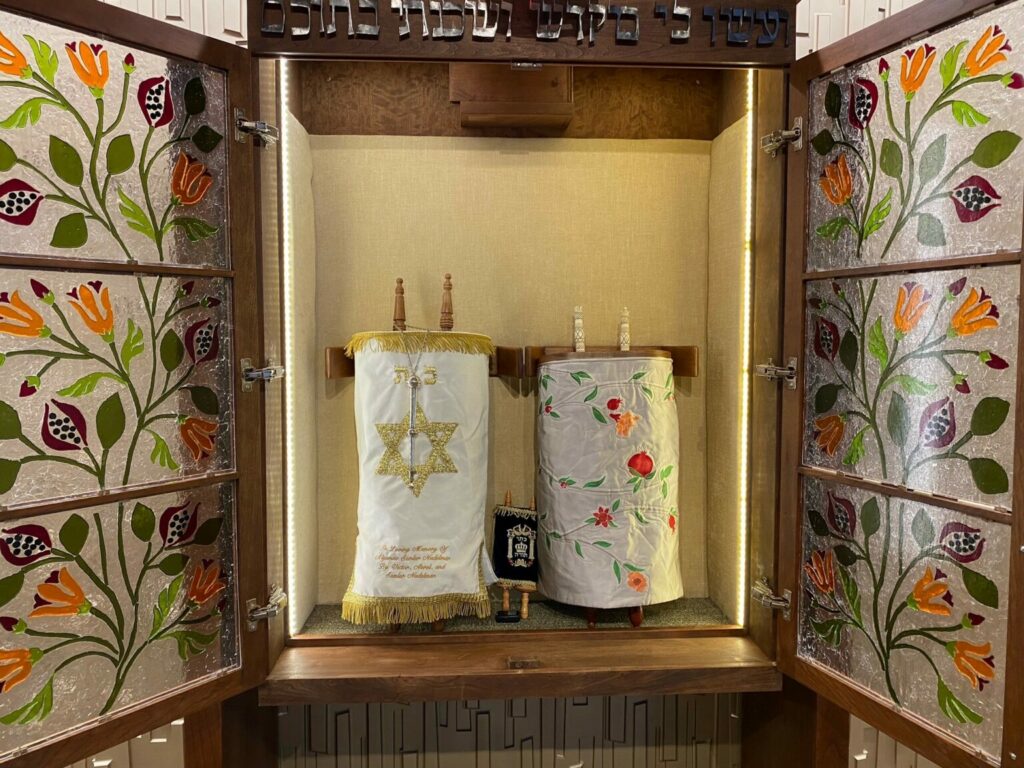
They’re back! Yes, after 2.5 years in Florida, the two Cedar Sinai Park Torahs out for repair are back on campus and ready to ring in 5784.
“The Torahs have had a wonderful vacation in Miami, and now they’re back!” said Eddy Shuldman, board trustee and spiritual life committee chairperson. “We are the people of the book. Our story as a people, and the guidelines for how we should live our lives, is contained within those scrolls.
They're back! Yes, after 2.5 years in Florida, the two Cedar Sinai Park Torahs out for repair are back on campus and ready to ring in 5784.
The Torahs have had a wonderful vacation in Miami, and now they're back! said Eddy Shuldman, board trustee and spiritual life committee chairperson. We are the people of the book. Our story as a people, and the guidelines for how we should live our lives, is contained within those scrolls. It's hard to describe the emotions we feel welcoming our Torahs home again.
Cedar Sinai Park's three Torahs were inspected by a sofer for the first time in 2019, thanks to the generosity of Marcy Tonkin. Suffering from cracks and smudges, two of the Torahs were taken by plane for repair by Rabbi Menachem Bialo, who checked one Torah (without its staves), and packed the other Torah in his carry on bag.
Plans for Rabbi Bialo or another sofer to bring the repaired Torahs back to Oregon kept getting waylaid, primarily due to Covid, and so it was decided that the Torahs should be mailed back instead.
We are grateful to Rabbi Michael and Cantor Ida Rae Cahana, and Aki and Devora Fleshler, who generously provided the postage to help us get our Torahs safely across the country!
One of the Torahs just repaired is a vuv, a 21-inch heavyweight Torah scroll written in a Good Bet Yoseph Sephard script approximately 50 to 60 years ago in Israel.
The other Torah repaired is our 16.25 lightweight Torah scroll written in a Good Bet Yoseph script approximately 120 years ago in Germany.
The Torahs needed repairs to fix cracking and faded letters, as well as airing out in a climate-controlled space, said Eddy.
The Nudelman family generously donated one of the Torahs in 1997 in memory of Alysmae Nudelman, and the fact that there are Nudelmans living with us now, makes the Torahs coming home even more special, said Eddy.
The latter Torah, the smaller one, had to be reassembled upon arrival, since its staves were removed for the flight to Florida, and were still off for the trip home.
Staff and residents used sinew and instructions provided by Rabbi Bialo to re-attach the parchment to the stave through three small holes.
My dad was a tailor, said Eddy. I should have been paying attention!
Then, the group carefully rolled the Torah through the five books of the Old Testament to re-attach the stave similarly on the other end.
What an experience! said resident Jeanine. This is an honor.
Agreed resident Ruth: Isn't this something? This is so moving.
Noted resident Eve: I have read from Torahs that aren't nearly as legible. I'm impressed with the writing. This is so readable.
Finally, the group put the Torahs in their beautiful covers, and placed them back in the ark in Cogan Chapel.
There's something lovely about this gathering because it integrates the holiness of sacred work with having fun, said Spiritual Life Director Cathy Zheutlin. This experience is priceless.
All are welcome to attend a special celebration/re-dedication of the two repaired Torahs, at a Saturday, October 7, Simchat Torah observance in Zidell Hall that begins at 7 p.m.
We still have one Torah on campus that needs repair! There is now a dedicated Torah/Judaica Fund to which people can contribute for the religious and spiritual upkeep of the Torahs and prayer books, through the Cedar Sinai Park Foundation.
###
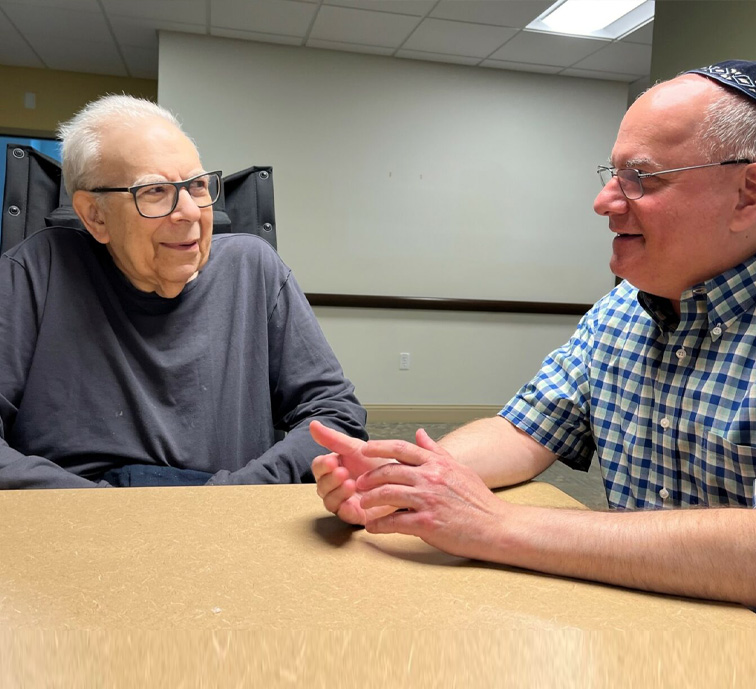
The Jewish community chaplain, Rabbi Barry Cohen, is going to be spending more time at Cedar Sinai Park!
“Before Covid, Rabbi Barry used to come to breakfast once a week to spend time with the residents and have conversations,” said Spiritual Life Coordinator Cathy Zheutlin. “Now that Covid is on the wane, he will be here for one-to-one visits throughout the campus every Monday. In addition to occasionally leading Shabbat and other holiday services,
The Jewish community chaplain, Rabbi Barry Cohen, is going to be spending more time at Cedar Sinai Park!
“Before Covid, Rabbi Barry used to come to breakfast once a week to spend time with the residents and have conversations,” said Spiritual Life Coordinator Cathy Zheutlin. “Now that Covid is on the wane, he will be here for one-to-one visits throughout the campus every Monday. In addition to occasionally leading Shabbat and other holiday services, he’ll offer some educational opportunities.”
Rabbi Barry grew up in Memphis, but was in the Midwest for school and much of his career. He and his family moved to Oregon in 2018, and Rabbi Barry joined the Jewish Federation of Greater Portland as its community chaplain.
Besides Cedar Sinai Park, Rabbi Barry visits seniors at 11 other retirement communities in the Portland area.
“A lot of people feel like they are on the outside looking in when they are Jewish living at a non-Jewish facility,” he said. “There are definitely times during the year when Jewish residents in non-Jewish facilities feel very lonely.
“In elder communities all across the city, people are really looking for connections. It doesn’t matter whether it’s the same or different religion, most elders are looking for someone to spend time with them.
“You never know what kind of interaction you’re going to have,” added Rabbi Barry. “Sometimes, it’s surface level, and other times it’s a very engaging conversation, and then once we have a personal connection, it can go deeper into the spiritual arena.”
“What I’m offering is support, where I’m present and actively listening, being as compassionate as possible.”
Robison Jewish Health Center/Harold Schnitzer Center for Living resident David Cohen (no relation to Rabbi Barry) said the Rabbi’s visits are wonderful. “I never really went to synagogue, but it’s nice to be able to talk to a rabbi,” he said.
“This is a good place,” said Rabbi Barry. “I like how it’s filled with a diversity of residents, but at the same time, you know you’re walking into a Jewish space.
“When you meet the residents and find out where they’re from, it doesn’t take long before you’ve made a connection. And then that connection leads to a conversation with someone else, and then that leads to a class you’re teaching on a Jewish topic or a worship service you’re leading, and the conversation goes from there.
“It’s hard to quantify, but when you walk into Rose Schnitzer Manor, it feels different here.”
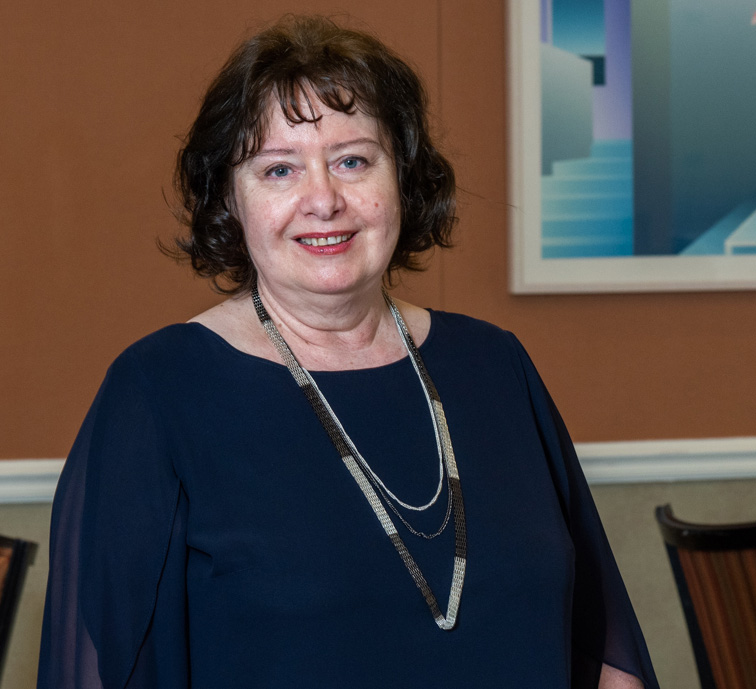
It’s not always easy to chase down Margaret Leontyev. She not only moves fast, but the longtime catering manager has many different projects that she is working on, all at the same time. We ended up chatting while Margaret multi-tasked.
“Events are a big part of my job,” said Margaret, as she moves toward her computer. “We organize and prepare everything, set up, and then clean up afterwards. For some events we will also help serve as well.”
Margaret opens her spreadsheets to share the hundreds of invoices she codes,
It’s not always easy to chase down Margaret Leontyev. She not only moves fast, but the longtime catering manager has many different projects that she is working on, all at the same time. We ended up chatting while Margaret multi-tasked.
“Events are a big part of my job,” said Margaret, as she moves toward her computer. “We organize and prepare everything, set up, and then clean up afterwards. For some events we will also help serve as well.”
Margaret opens her spreadsheets to share the hundreds of invoices she codes, signs, and tracks monthly for both sides of campus, and then sends to accounting. Margaret loves crunching the numbers. Each month she also creates reports on spending.
Human Resources Director Geneva Dougal says people are always talking about Margaret’s wonderfulness and how amazing her spreadsheets look. “If Margaret’s ears are itching,” said Geneva, “it’s because people are always saying nice things about her. She is brilliant.”
Margaret and her husband Andrey came to the United States from Lithuania in the late 1990s to join Andrey’s six sisters and two brothers who had earlier moved to the states. In 2014, Andrey’s mother (who is now 93), also joined the rest of her family as she flew in from Ukraine.
Cedar Sinai Park was the first job offer that Margaret received in the United States. Formally trained as a civil engineer in Lithuania, Margaret started as a server at Rose Schnitzer Manor when it opened its doors in January of 1998.
Ten years ago, Margaret became catering manager, and in January she celebrated her 25th year at Cedar Sinai Park.
“I like it here,” said Margaret. “The philosophy of Jewish facility to respect, to love, and to be kind; I truly support what we stand for. And the friendships that we have formed with everyone truly makes this job so fulfilling and rewarding.”
Was there ever a time in 25 years when Margaret wasn’t busy?!
“No, never,” she says. “It’s not in my character to not do something. I like people who work hard and who pursue goals.”
Did the 25 years go fast?
“Yes, very fast. We have had hard times, and we have had good times,” Margaret says, smiling.
It’s probably no surprise that when Margaret leaves Cedar Sinai Park for the day, she goes home to cook.
“I’m always cooking,” she said. “We have a big family three grandchildren now and a fruit tree orchard. We are planting tomatoes and cucumbers, and I am canning, making sauerkraut for winter.”
“Margaret is always helping, even if you don’t ask,” says Dusanka, over the whirr of the blender.
Dusanka has also been with Cedar Sinai Park in food service for many decades, and added: “Margaret is so dedicated. She always jumps in to help and she makes sure everything is done. I’ve seen her line up tables and tablecloths in Zidell Hall; and they have to be just right before she is satisfied.
“Margaret will never walk away from an event until it’s perfect. She really deserves to have her story told.”
###
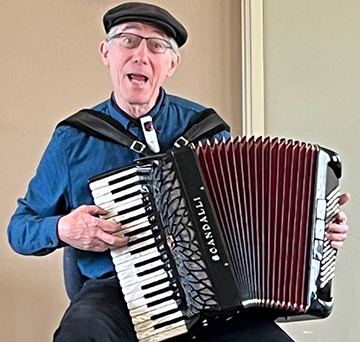
Watching our slender volunteer Alan Moses lug his 21-pound accordion through the halls of Cedar Sinai Park to then set it on his knee for a playing and singing session with the residents is truly a lesson in dedication.
“It still feels like I’m wrestling an octopus every time I strap this thing on,” said the self-deprecating Alan, with a chuckle, as he nibbled an apple between gigs at our Home. “I found some great videos on accordion ergonomics,
Watching our slender volunteer Alan Moses lug his 21-pound accordion through the halls of Cedar Sinai Park to then set it on his knee for a playing and singing session with the residents is truly a lesson in dedication.
“It still feels like I’m wrestling an octopus every time I strap this thing on,” said the self-deprecating Alan, with a chuckle, as he nibbled an apple between gigs at our Home. “I found some great videos on accordion ergonomics, and I’m working my technique, but I think the main thing is just not to play too many hours in one day.”
Alan is typically at Cedar Sinai Park once or twice a week, in between playing for a hospice group, and helping to care for his pre-teen grandchildren.
“Knowing viscerally that you have made a difference in a person’s life is a great experience,” said Alan. “I knew as soon as I retired that I wanted to find an avenue to give back.
“I like to envision myself as helping, but it’s such a great feeling for me; it just feels good to do.”
This National Volunteer Week, please thank our beloved Cedar Sinai Park volunteers, like Alan, who help us daily with the care and support of residents.
Alan grew up in the Santa Barbara area in a musical family, and learned to play the piano as a child, participating in bands and other group settings. As a young parent attending camping festivals, he was frustrated that his given instrument was not portable and that he couldn’t participate. Then in the early 1990s, his wife Nancy Friedland found him an accordion.
“The right hand of the accordion is similar to the piano,” said Alan. “The biggest difference is that the accordion is a wind instrument. So, if you run out of breath in the bellows, it doesn’t make any noise. So that took me a while to get my head around. And then the left-hand buttons are quite different than anything I’d ever used.
“My right hand feels at home, and my left hand feels lost. It’s kind of an interesting challenge. I still feel like a bit of a duffer.”
Alan’s audiences certainly don’t agree with that assessment. “Oooohhh, I love that song,” said Ruby, as Alan charges into a rousing verse of Yankee Doodle Dandy.
“The accordion looks funny,” said Alan. “It puts people at ease.”
Alan and Nancy used to perform at senior centers in California (Nancy plays the mandolin). The couple moved to Portland in 2014 with the birth of their second grandchild. Both retired—Alan said he was in “middle management at a university”—he began volunteering as a musical companion for bedside visits to a hospice organization.
“My mother moved at the same time we did. She said ‘you can run, but you can’t hide!’ Eager for a change since Alan’s father had died a handful of years previously, Marilyn Moses called Rose Schnitzer Manor on her own and made a reservation for a guest visit. After two weeks, she said, ‘do I have to go back?’”
Marilyn lived at Rose Schnitzer Manor from 2014 to mid-2020 when she unexpectedly had a stroke.
She loved the place, the quality of care she got from everyone,” said Alan. “This place does an incredible job of staffing so she had a last good phase of her life while she was here. I am just so impressed with this organization.”
After Marilyn passed, Alan began volunteering for Nancy Heckler Adult Day Services Director on the Robison side of campus, and he has steadily bumped up his volunteer time ever since.
“It’s not performance; it’s about getting everyone to participate and comfortable with the singing, and the chatting in between,” said Alan.
“Being able to bring music to people in various times of their life is very gratifying. The benefits of music become really visible.
“When my wife’s dad was in cognitive decline, we would play for him. He was no longer able to remember Nancy’s name, but he could recall every word of the folk songs. We were able to see how much the music brought to him. At a time when he was confused, he could sing a song and feel competent.
“I learned a lot of the songs from my parents,” added Alan, “so there’s a feeling of connection there with my family, too.
“I feel connected to this place, as well. It’s one of the things that keeps me coming every week.”
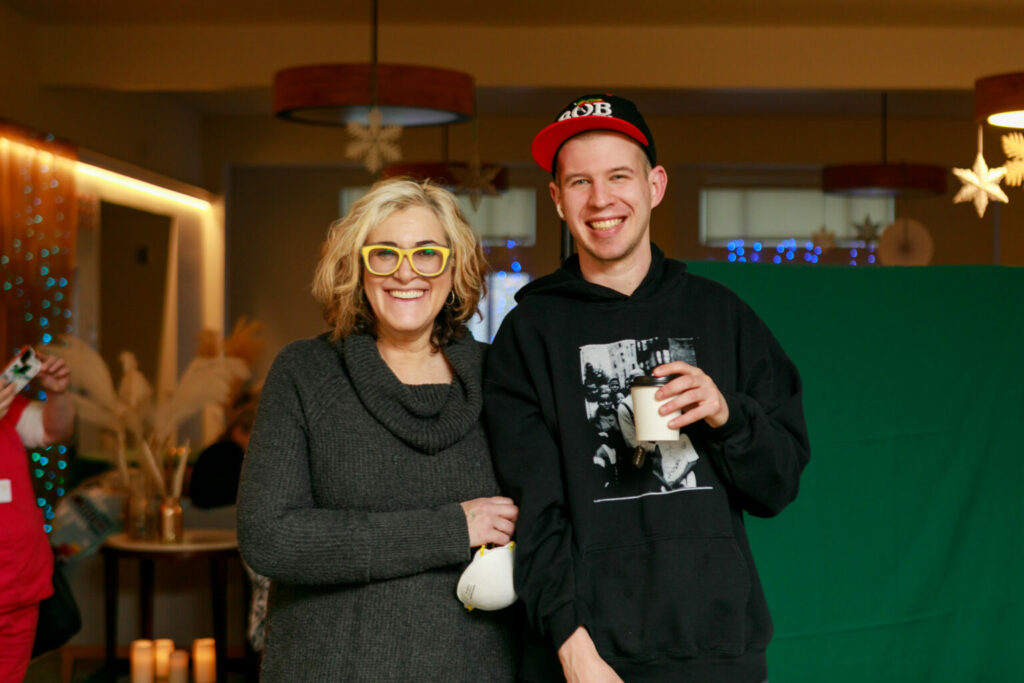
Trevor Richen grew up in Portland in the food world. His great grandfather owned Griffin’s, a 1970s “cafeteria” in downtown Portland, where his parents and extended family worked before Trevor was born. The Rose Schnitzer Manor Assisted Living server considers himself a foodie.
“I like everything,” said Trevor, wearing one of his stylin’ baseball hats and duds after a shift. “I’m a sucker for pizza, but I also love branching out. I love Mexican food,
Trevor Richen grew up in Portland in the food world. His great grandfather owned Griffin’s, a 1970s “cafeteria” in downtown Portland, where his parents and extended family worked before Trevor was born. The Rose Schnitzer Manor Assisted Living server considers himself a foodie.
“I like everything,” said Trevor, wearing one of his stylin’ baseball hats and duds after a shift. “I’m a sucker for pizza, but I also love branching out. I love Mexican food, Thai, Chinese. And I like to cook.”
Trevor even took a 16-week culinary class, which brought him to Cedar Sinai Park in December of 2021.
“My culinary class was led by Chef Jon who used to work here, and he recommended I apply for a job. I already lived here at Kehillah and he put in a good word for me with Andy Staggs, culinary services director.
“Andy Staggs; executive chef and culinary director contacted me and scheduled an interview, which was literally right after I graduated from the class.
“I love it here,” said Trevor. “It’s the best decision I ever made. And the second-best decision was living at Kehillah.
“I love being around the people, coworkers, and the residents. I think being amongst a community that’s full of good vibes and love is really big. It makes things easy.
“And my parents can tell I’m happy, and they are truly indebted to this place.”
Trevor grew up in Portland and attended Madison and Wilson (now Ida B. Wells) High Schools, the latter of which was a family tradition (his grandfather was in the first Wilson graduating class). He moved into Kehillah when it opened 10 years ago for adults with developmental disabilities. Located on the Cedar Sinai Park campus, Kehillah supports resident inclusion within the community through social activities and employment assistance.
Previous to Cedar Sinai Park, Trevor worked as a dishwasher at St. Honore Bakery, and had to get up at 5 a.m. to take the bus to Northwest Portland. Covid closed St. Honore, and Trevor was out of work for a few months, then returned to St. Honore from May to August 2021, until he began his culinary course.
“I like that I can walk now literally straight up the hill, and don’t have to take the bus to work,” said Trevor.
Trevor’s favorite part of Cedar Sinai Park?
“I like working with people and getting to know everybody. Seeing everyone smiling because of the food we make is great. And I really like the vibe here; everybody’s just really, really nice and is in good spirits.
“Everybody’s always good to me. I can’t really pinpoint one thing. This place is really amazing for me. I love working here. I think my parents can see that I’m happy, and working in a place that I love.”
Trevor typically works Thursday through Monday.
In his off time, Trevor loves to write and paint and listen to music such as classic rock, reggae, or hip hop. He is an avid exerciser and goes to the Mittleman Jewish Community Center to lift weights and shoot baskets. He loves to talk hockey!
What’s the best meal on campus?
“I really like when we do the spaghetti with meat sauce,” said Trevor. “I’m a sucker for meat sauce.”
Trevor is a favorite on campus if you want a hug or a good listening ear.
“All of the people here are really cordial and sweet,” he said. “I enjoy it here. It’s probably one of the best places to work.”
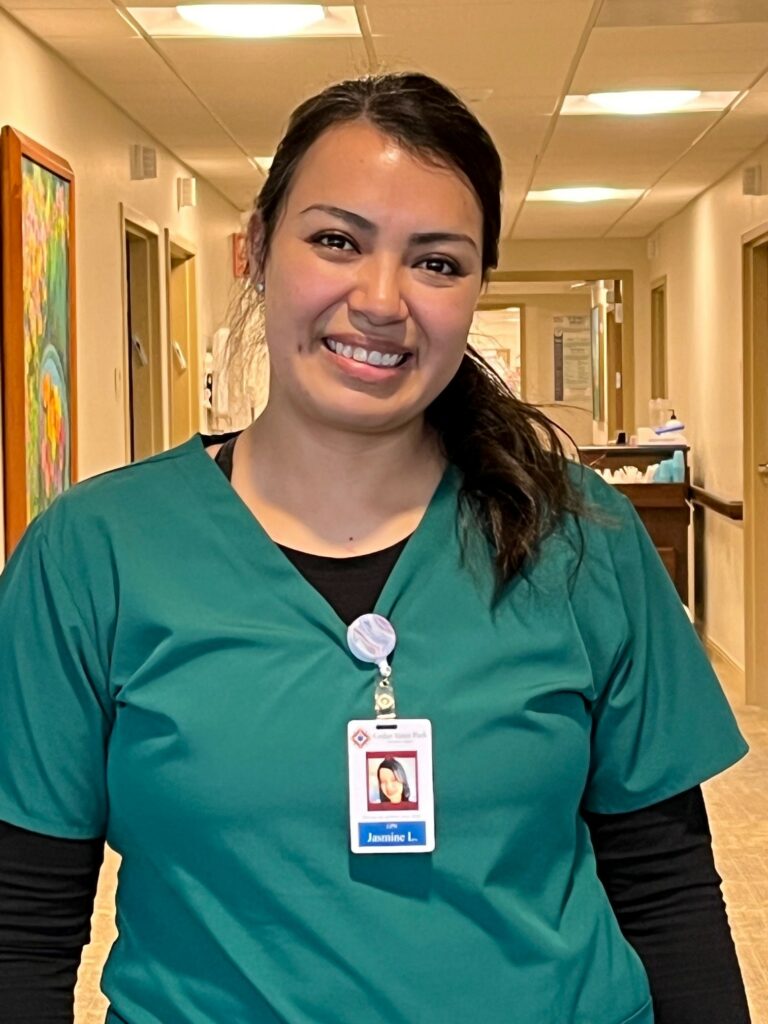
Jasmine Lohn, L.P.N., C.N.A., is a prime example of the interconnectedness and tradition that is Cedar Sinai Park. Her parents worked at Robison Jewish Home when Jasmine was a young girl! So did her grandmother and aunt!
“She looked just the same,” said Harold Schnitzer Center for Living Resident Joeen Rodinsky (z”l), whose mother lived at Robison in the mid-1990s and was cared for by Jasmine’s mother, Aura. “When I came her to live,
Jasmine Lohn, L.P.N., C.N.A., is a prime example of the interconnectedness and tradition that is Cedar Sinai Park. Her parents worked at Robison Jewish Home when Jasmine was a young girl! So did her grandmother and aunt!
She looked just the same, said Harold Schnitzer Center for Living Resident Joeen Rodinsky (zl), whose mother lived at Robison in the mid-1990s and was cared for by Jasmine's mother, Aura. When I came her to live, I looked at her, and she said, 'Do you know who I am? I am Aura's daughter.' It was immediate love. I adore her.
Jasmine was born in California where her parents, Aura and Luis, worked at a Jewish community in Sylmar. When they moved to Oregon in 1991, they joined Robison and Jasmine remembers coming to Robison as a child. Aura's mother Julia also worked at Robison and so did Luis's sister, Maria.
It was a cozy place, remembers Jasmine. When you walked into the reception area, they used to make cookies, and it smelled like home.
I remember one resident in particular who used to make necklaces out of beads. She had a big sunflower on the back of her chair, and she would always come and talk to me. And I had my little dog with me.
So I would sit there and eat the cookies that they would give me at reception, and talk with her, and she would show me her collection. She had bags and bags of beads.
It was always really inviting.
Jasmine occasionally read to the residents and put lotion on their hands. Later, she attended Beaverton High School and visited Robison as a teen through their Health Careers program. She said her upbringing definitely influenced her decision to go into health care.
After becoming a certified nursing assistant, she worked at West Hills Village, and then she managed a foster home.
And then in 2010, my mom was like, 'Come apply at Robison! We can all be together. So I ended up coming here and applying and got hired.
Jasmine and her parents all worked at Robison together for the next eight years. She's mainly worked on the Robison side of campus, in post-acute and rehabilitation, and the Harold Schnitzer Center for Living households.
Though Aura is mostly retired, and Luis is working closer to home, Jasmine has stayed on. She attended Portland Community College for her prerequisites to nursing school at Sumner College, but became a licensed practical nurse in 2016.
I enjoy the residents, she said. The relationships that I've built with the residents here, especially in long term care, they're just like family. They're like my grandma and grandpa's, so I really enjoy being around them. I eat dinner with them, and communicate with them about what they're doing.
And every morning, I go say 'hello' to Joeen. I let everyone know that I'm here and then do computer work until the residents are up, and it's time to do blood sugars and meds and then make phone calls.
We have a good team. Everyone is passionate about what they do, and they're caring and reliable. Even when we had the last winter storm, people were staying over and working extra shifts, and being accommodating for other staff members that couldn't come in.
Jasmine lives near McMinnville and spent five hours on the road during the snowstorm going 23 miles an hour and taking it really slow to get to Robison to make her shift (I was a little late, she confessed). Jasmine even spent a night in the Holzman household to ensure she would be here to work the following day.
In her free time, Jasmine enjoys walking and hiking with her fiance, Duncan. She has three children (Aimee, 11; Allyson, 9, and Ailis, 5), and three dogs (a pug, a standard poodle, and a St. Bernard) and Aura and Luis live a block away. They run back and forth to help, said Jasmine.
It's beautiful, that she is here, having grown up here with her family, said Joeen. She is the sweetest young lady. She has a special quality to her. I love Jasmine.
Added Jasmine: I really like it here.
###
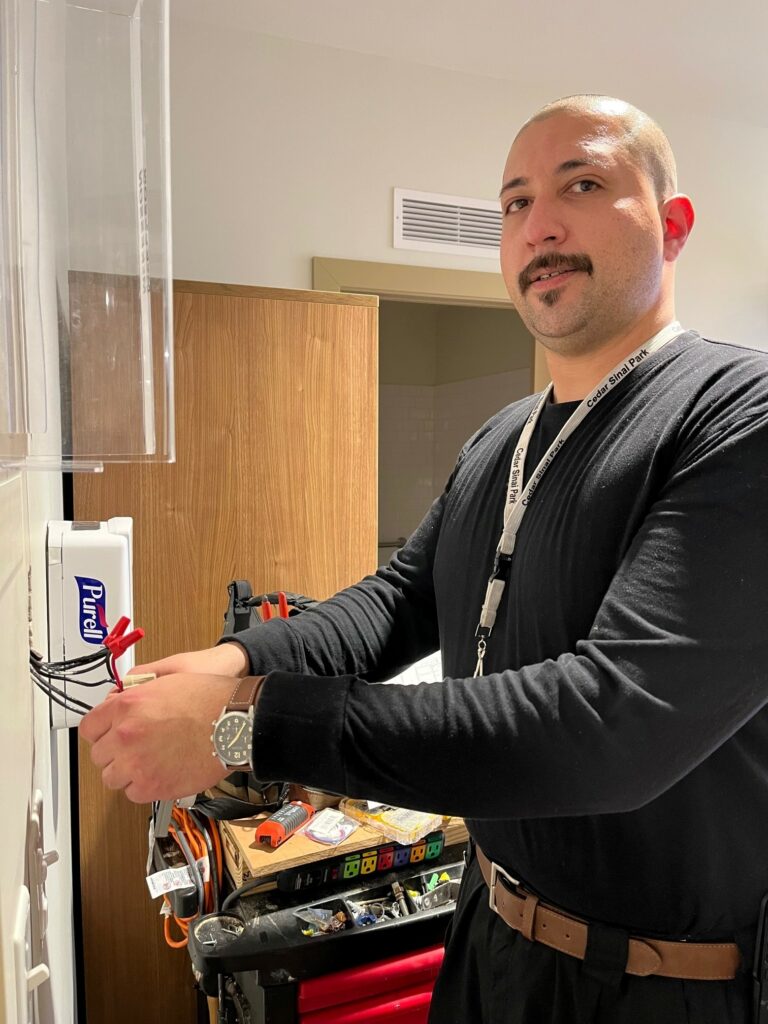
There isn’t much Aaron Farrar hasn’t taught himself about fixing stuff.
“I wasn’t really much of a handyman until I took an opportunity at another facility several years ago as the director of maintenance,” said Aaron, who became Cedar Sinai Park’s lead maintenance technician almost two years ago. “The former director quit and walked off the job, so there wasn’t anyone I could turn to for advice. I had no training whatsoever. They just threw me in and told me to figure it out.
There isn’t much Aaron Farrar hasn’t taught himself about fixing stuff.
“I wasn’t really much of a handyman until I took an opportunity at another facility several years ago as the director of maintenance,” said Aaron, who became Cedar Sinai Park’s lead maintenance technician almost two years ago. “The former director quit and walked off the job, so there wasn’t anyone I could turn to for advice. I had no training whatsoever. They just threw me in and told me to figure it out.
“It was just me and YouTube back then, and now over the years, I’ve done all kinds of different repairs. I truly have learned so much these last several years. I’ve found that sometimes, the best way to learn something is just to get in there and do it.”
Aaron grew up in southern California and moved to the Northwest 17 years ago for a change of scenery. First landing in Seattle where he worked in commercial and industrial heating and air conditioning, then on to Portland where he obtained jobs at memory care and assisted living facilities.
He joined Cedar Sinai Park in April of 2020, during the height of the pandemic. “The Jewish community seems to really look out for their own people, but happily welcomes people of many other backgrounds and ethnicities as well, and that was kind of cool to me.” said Aaron.
Aaron drives to Cedar Sinai Park from Vancouver every day, what can be a long drive given traffic, depending upon his hours.
“It’s not a thing of convenience,” said Aaron, with a laugh. “I enjoy coming to work. I enjoy what I do, helping residents and staff.”
“I’ve been treated well since I’ve been here. Vacation hours accrue quickly, and we even get free employee meals, which is always a plus. It seems real family oriented here. There are a lot of people who have worked here for over 20 years, which in my opinion speaks volumes. Things have gone well.”
The day we spoke with Aaron, he was troubleshooting an electrical issue on a couple of baseboard heaters in the 600 Hall of Robison, but most days, he is all over campus. Some days, his tasks are as simple as moving a bed or repairing a shelf. But he’s also dealt with extinguishing a dryer fire, repairing broken water lines, and is the backup for Building Services Director Tammy Heard.
“Tammy offers the team a lot of support, and so we do our best to support her, as well.”
When asked about the work he does on a typical day, Aaron explained: “You try to stick to a plan, which some days works fine, but then on other days, you’re not even close,” he said, laughing. “Sometimes, a repair that you thought would be a simple job ends up taking much longer. I help out here and there with the normal day-to-day tasks, but I also deal with the slightly more technical and complex issues that arise, which often require not only technical know-how, but also time spent researching effective solutions, and a lot of patience.
“For example,” said Aaron, “since starting at Robison nearly three years ago, I’ve taught myself, and others on the team, how to troubleshoot and repair hospital beds, mobile and ceiling-based patient lifts, and even the control operators that open and close many of the automatic doors in the facility. Prior to my arrival, most of that work was handled strictly by outside vendors.”
Last year, Aaron played a key role in obtaining approvals for both Robison and Rose Schnitzer Manor to receive $200,000 in state funds from the Oregon Department of Human Services, as part of their Long-Term Care Capital Improvement & Emergency Preparedness Program. As a result, both buildings received much-needed major repairs on their HVAC systems, and Robison was equipped with more than a dozen medical grade, high-efficiency HEPA air purifiers.
Two weeks ago, during Portland’s big snowstorm, Aaron drove the Cedar Sinai Park van to collect dozens of employees from their homes and got them to work safely, and then home again after their shift.
“Cedar Sinai Park has equipped its two vans with really nice, studded tires, so we were practically the only ones on the road who were still moving,” said Aaron. “There were busses in the middle of the road, completely abandoned, while other vehicles were sliding uncontrollably into each other like bumper cars. It was intense and quite stressful, for me at least.
“Jack Hellyer, the other maintenance technician who drove for the winter weather shuttle, on the other hand, didn’t seem to be bothered one bit by all the driving he did in such icy conditions,” said Aaron. “He apparently enjoyed it. But overall, the driving went well. We just made sure to drive really, really slow, making sure to get everyone to and from work safely.”
Aaron loves to read in his off time, mostly nonfiction such as politics, global affairs, and history. He’s computer savvy—he can build a website from scratch and knows how to code— and is currently learning how to use one of the many distributions of the Linux operating system. Last summer, he piloted his first plane, a small Cessna. He is a mentor to other employees on the maintenance team.
“I do my best to mitigate issues, put out what fires I can, and do whatever it is Tammy needs done at the moment.
“I really like it here.”
###
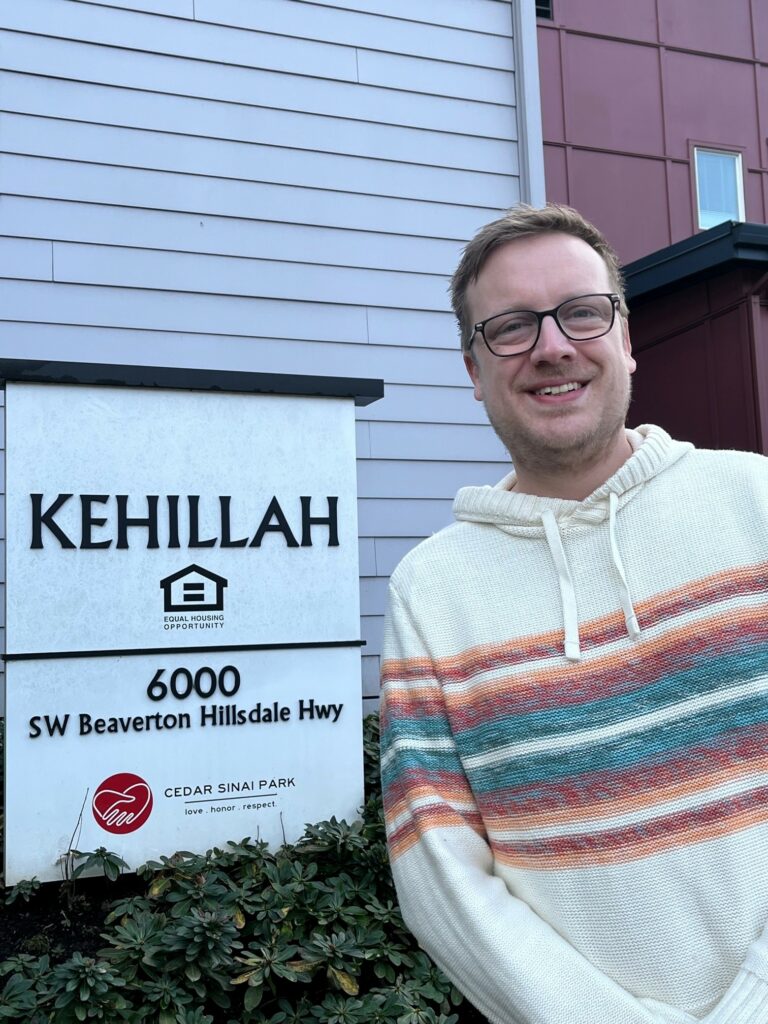
Nathan Burgess was a care provider at Jewish Family & Child Services in 2014, when he was asked by a parent there to apply for the role of in-house manager at Kehillah.
“I used to come here to take folks out in the community to do fun things,” said Nathan. “I met a parent here and she said they were looking for an on-site manager.”
That was eight years ago, and Nathan has been managing the apartments of Kehillah’s 14 residents and tending to their needs ever since.
Nathan Burgess was a care provider at Jewish Family & Child Services in 2014, when he was asked by a parent there to apply for the role of in-house manager at Kehillah.
“I used to come here to take folks out in the community to do fun things,” said Nathan. “I met a parent here and she said they were looking for an on-site manager.”
That was eight years ago, and Nathan has been managing the apartments of Kehillah’s 14 residents and tending to their needs ever since.
“I love it here,” he said. “The residents are like your family. Some need a little more help than others, but we still love all of them.”
Kehillah Housing—a project of Cedar Sinai Park in collaboration with Jewish Family & Child Services—is celebrating its 10th anniversary this year! Its’ mission is to care for adults with development disabilities who need affordable housing and access to social services that support their ability to live independently in the community.
Ground broke on the facility in 2012, and opened a year later on September 1, 2013, with management through the Department of Housing and Urban Development. There is little resident turnover at Kehillah, said Nathan—11 of the original residents remain--and the wait list is long, an indicator of the lack of housing for adults with special needs.
Current residents’ ages range from 30 to 50, said Nathan, and there are 10 males and four females. Most work at least one day a week at a job off site.
Nathan also works outside of Kehillah, full-time at the Coffee Creek Correctional Facility in Wilsonville, supervising and training GED tutors and helping inmates with their training, often in the facility’s computer lab. Friday night through Sunday he is fully concentrated at Kehillah, coordinating cooking classes, movie nights, crafts, games, parties, and more.
“I try to get the residents out of their rooms to try new things,” said Nathan. “People love to eat and their favorite foods are pizza and tacos.”
Nathan grew up in southeast Portland near Mt. Tabor. His office is lined with space Lego’s and he confesses his Kehillah apartment has many more completed Lego sets, décor that is okay, he says for his new fiancée, Brandy.
The self-described “solid cleaner who is good with a plunger,” Nathan is supported by Cedar Sinai Park’s Facilities team on bigger fix-it projects.
“Everyone is really friendly here, and it’s a good community,” said Nathan. “We all get along, and I’m a big fan of the activities where people are enjoying themselves.”
###
###










